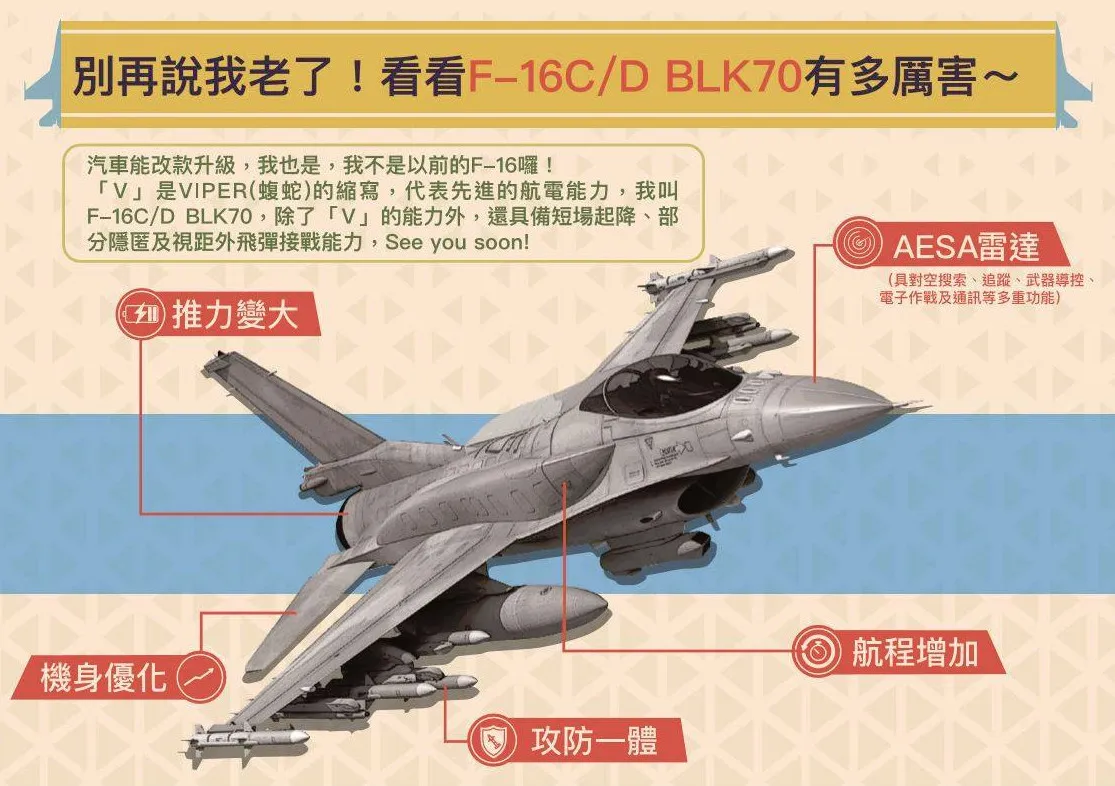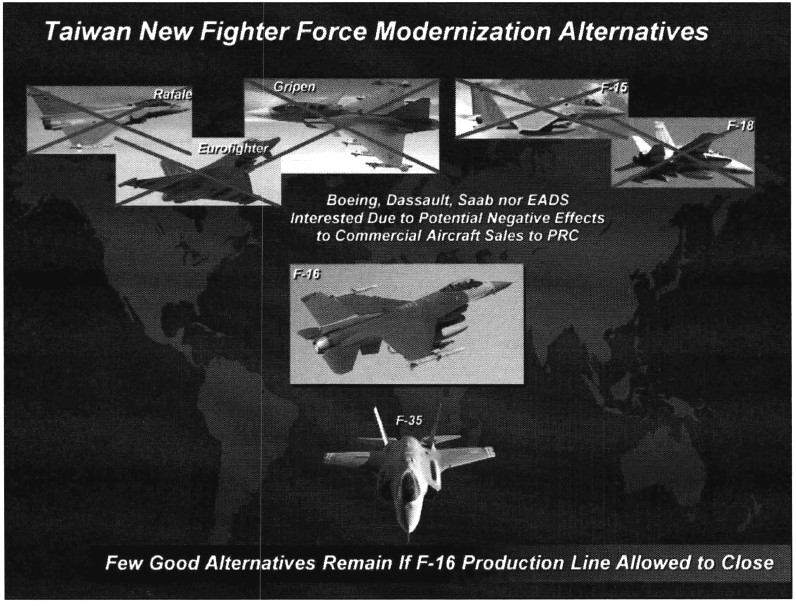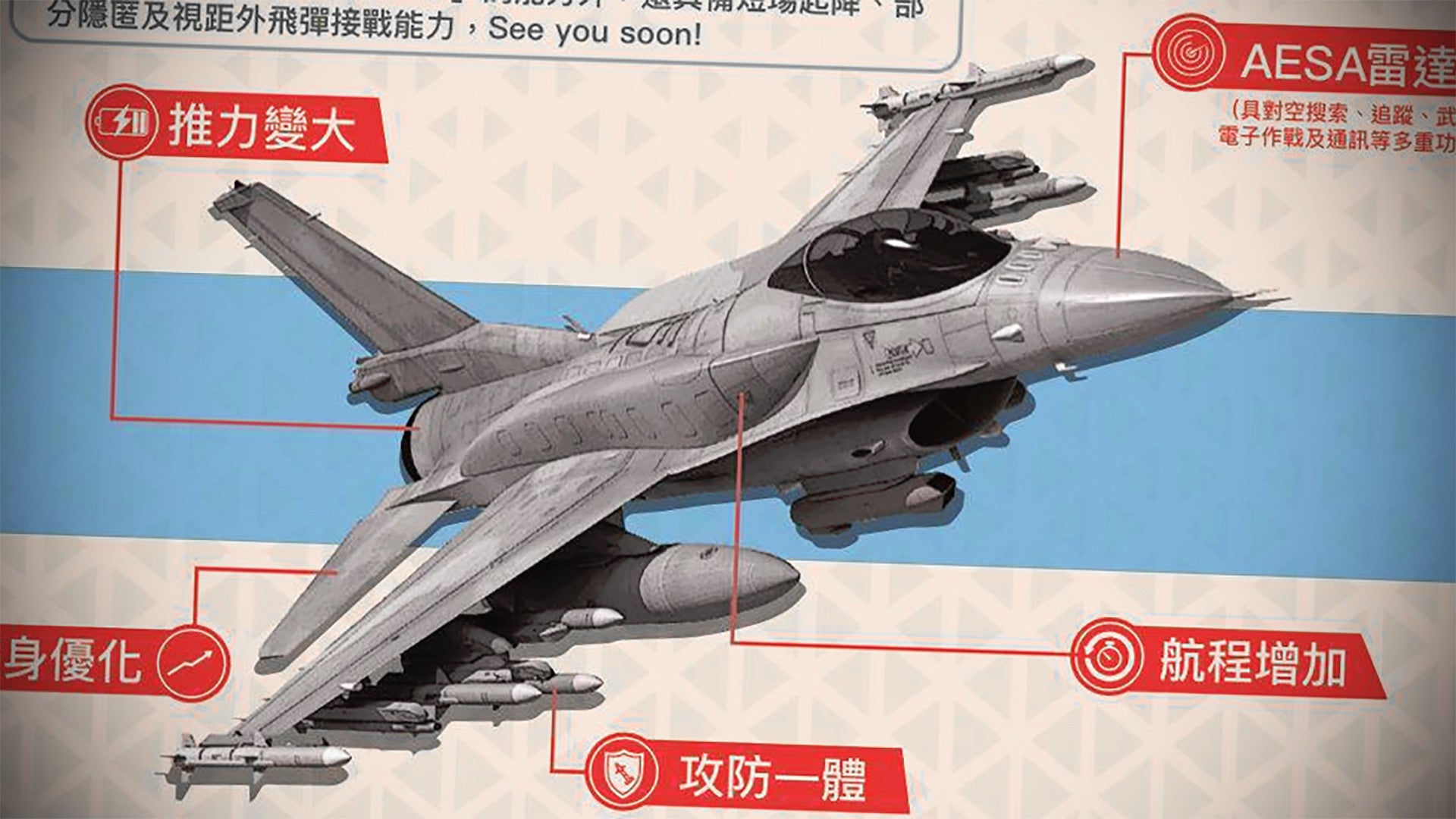Taiwan’s Air Force has confirmed it expects to buy more than 60 new Lockheed Martin Block 70 F-16C/D Vipers and released an infographic about the fighter jets that says “See you soon!” This comes amid reports that President Donald Trump’s Administration has submitted the proposed deal to Congress for an informal review and approval. Doing this means the U.S. government doesn’t have to formally announce the potential sale, which is still guaranteed to infuriate China and has the potential to scuttle negotiations to end a trade war between the two countries and otherwise inflame tensions.
The Taiwanese Air Force included in the infographic in a post on Facebook on August 16, 2019. That same social media post also declared that the United States had agreed to sell Taiwan the advanced F-16s in “Minguo 108,” or 2019. The government on the island uses the Minguo calendar, which starts in 1912 with the founding of the Republic of China, for official documents. Also on August 16, 2019, there were numerous reports, citing anonymous sources, that the Trump Administration had asked the House and Senate Foreign Relations Committees to conduct an informal review of the possible sale. News first emerged that the U.S. government was considering selling the fighter jets to Taiwan, something China has said would be crossing a “red line,” in March 2019.
The U.S. State Department has refused to confirm that this process is in motion, saying it doesn’t comment on possible foreign arms sales until Congress has received a formal notification. Typically, this formal alert coincides with a public announcement from the Department of Defense’s Defense Security Cooperation Agency (DSCA), which handles foreign military sales requests.
After a formal notification, Congress is supposed to have 30 days to approve the deal. It is important to note that this does not guarantee the sale and Taiwan and Lockheed Martin would have to hash out the final terms of the contract. However, the Taiwanese Air Force and a number of members of Congress are certainly treating it as all but a done deal.

The sale is “critical to improving Taiwan’s ability to defend its sovereign airspace, which is under increasing pressure from the People’s Republic of China,” Senator Jim Risch, an Idaho Republican and the Chairman of the Senate Foreign Relations Committee, said in a statement according to Defense News. “Taiwan is a steadfast partner of the United States in advancing a free and open Indo-Pacific, and the United States remains firmly committed to supporting its defense.”
“Hell, I’d like to sell them F-35’s, so the least we could do is sell them F-16s,” Senator Corey Gardner, a Colorado Republican who chairs the Senate Foreign Relations Subcommittee for Asia, said. “It’s the law.”
Gardner was referring to the 1979 Taiwan Relations Act, which followed the U.S. government’s formal recognition of the government in Beijing as the sole legitimate government of China. Under the law, the United States reserves the right to sell weapons to authorities in Taiwan for the purposes of their defense, as well as maintain diplomatic liaisons with them, until such time as the status of the island is resolved. Chinese authorities see Taiwan as an integral part of the country and have threated military action on numerous occasions if it attempts to declare independence.
China criticizes all U.S. government arms sales and other engagements with Taiwan, but has been particularly opposed to the sale of new fighter jets. The Taiwanese Air Force Facebook post notes that it has been trying to acquire new F-16s of any kind since “Minguo 92,” or 2003. Presidents George W. Bush and Barack Obama both rejected those requests. The Obama Administration did eventually approve a plan for Taiwan to upgrade its existing fleet of approximately 145 F-16A/B Vipers to the much more advanced F-16V configuration, which is similar in many respects to the Block 70.
However, as The War Zone has previously reported, the new build Block 70 jets would give the Taiwanese Air Force a major boost in both capability and capacity. Just like its F-16A/Bs, Taiwan’s other core fighters, including the French-made Mirage 2000 and indigenously built F-CK-1 Ching-Kuo, are rapidly aging and will be in need of replacement. At the same time, China is aggressively modernizing its military as a whole, but has put particular emphasis on developing and new combat aircraft, including stealth fighters, multiple new stealth bombers, and fleets of unmanned aircraft.

The upgraded F-16Vs and the new Block 70 Vipers offer Taiwan a qualitative leap over these older aircraft, as well. Most notably, both sets of jets will have Northrop Grumman’s AN/APG-83 Scalable Agile Beam Radar (SABR), an active electronically scanned array type that will allow pilots to spot and track targets, including stealthy, low flying, and hard to detect ones, at longer ranges and do so more accurately, among other advantages. The Taiwanese Air Force’s infographic shows a Block 70 configuration with conformal fuel tanks, which would significantly extend the aircraft’s striking range and would be valuable for long-duration patrols around the island. They can also increase the F-16’s available weapons stations for many mission profiles. The Block 70 configuration has a number of other improvements that The War Zone
has covered in detail in the past.
The infographic also shows a Block 70 jet equipped with a new launcher that allows it to carry three AIM-120 Advanced Medium-Range Air-to-Air Missiles (AMRAAM) on a single pylon, which will help increase its air-to-air magazine depth. This would be a crucial enhancement for attempting to defend the island from an aerial onslaught originating from mainland China. Lockheed Martin first revealed this option in February 2019 as part of its rebranded F-21 proposal for India’s fighter jet competition.

In addition, Lockheed Martin displayed a model of a Block 70 F-16 carrying what looked to be an Infrared Search and Track (IRST) sensor pod at the recent biennial Taipei Aerospace & Defense Technology Exhibition, leading some to believe that either the upgraded F-16Vs or new build Block 70 F-16s for Taiwan might come equipped with that system. The design appears distinct from Lockheed Martin’s Legion Pod, which contains the IRST21 system.
IRST sensors offer a valuable alternative and complement to radars when it comes to spotting stealthy aircraft at extended ranges, which could be particularly useful for Taiwan given China’s stealth advances, such as the J-20, which is now in active service in increasing numbers. You can read more about the Legion Pod and IRSTs, in general, in these pervious stories linked here and here.
Whatever the exact package includes and regardless of whether the proposed sale is formal or not, China is almost certain to be apoplectic about the deal. Tensions between Beijing and Taipei have steadily been rising this year already and Chinese President Xi Jinping has threatened on multiple occasions to invade the island if it appears that the government there is moving toward declaring independence.
The Chinese government has branded Taiwanese President Tsai Ing Wen, who has a very close relationship with the Trump Administration, as an “independence extremist” in the past. Recently, she voiced support for protesters in Hong Kong, another semi-autonomous region of China, and described Taiwan as “a democratic country & a responsible member of the international community” in the process.
Relations between the United States and China have been frigid lately, as well, primarily due to a trade war, though Beijing and Washington has a number of other ongoing disputes, including over Taiwan and Chinese claims to the South China Sea. It seems very likely that the F-16 deal could scuttle talks aimed at finally ending the trade impasse for the foreseeable future.
“We can’t allow that to dictate our foreign policy or dictate our policy toward Taiwan,” Senator Marco Rubio, a Florida Republican, said in defense of the F-16 sale.
This statement did come after Trump appeared to let trade talks influence the U.S. government’s response to what is happening in Hong Kong, with the President issuing a Tweet in support of Xi and calling on him to meet with the protesters there directly. Before that, Commerce Secretary Wilbur Ross had described the situation in the semi-autonomous region as an “internal matter” for China to solve.
China has also reiterated a threat to sanction American companies that sell arms to Taiwan, though this is something it has vowed to do multiple times in the past without following through. Given the state of U.S.-Chinese relations, it is possible that Beijing might actually pursue this course of action this time.
At the same time, the United States has imposed an arms embargo against China since the 1989 massacre of pro-democracy protesters in Tiananmen Square and it is unclear how much this might actually impact the companies involved in any F-16 sale. Nearly a decade ago, Lockheed Martin actively pushed the U.S. government to allow it to sell new Vipers to Taiwan, including by arguing that it, unlike Boeing in the United States and aircraft manufacturers in Europe, had no business interests in China that could get upended by the sale.

There remains a real possibility that the Trump Administration may offer to scrap the F-16 deal as part of its ongoing trade negotiations with China. This would be a big smack in the face to Taiwan, though, and would show on a grand scale that the United States is willing to sell out major regional partners in order to realize favorable trade deals with far less friendly countries. Still, with Taiwan and members of Congress now publicly talking about the deal, changing course would create a massive outcry for both Taiwanese authorities and American legislators.
All told, it looks increasingly hard to see how the U.S. government won’t approve the sale of Block 70 F-16s to Taiwan and cross Beijing’s long-held “red line,” no matter what China’s responses might be.
Contact the author: joe@thedrive.com
